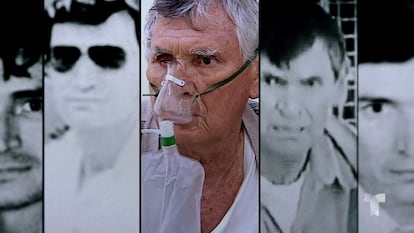Mexican cartel ‘boss of bosses’ denies any criminal past
The former leader of the Guadalajara Cartel, Miguel Ángel Félix Gallardo, has given an interview for Telemundo in which he says he had nothing to with the killing of DEA agent Enrique Camarena, for which he is serving a 40-year sentence

After 32 years behind bars, the man who was once the first boss of all narco bosses in the history of Mexican drug trafficking has decided to talk. Miguel Ángel Félix Gallardo, who is serving a sentence in a maximum-security prison in Guadalajara for the brutal murder in 1985 of undercover DEA agent Enrique Kiki Camarena, appears in front of the cameras of US television channel Telemundo as a frail old man – in a wheelchair, blind in one eye and deaf – with an oxygen tank to treat the “serious pneumonia” he claims to be suffering from. It is an undistinguished look for someone who controlled the strings of drug trafficking in the 1980s and who turned narcotics into a multi-million business that other senior cartel leaders would inherit, among them Joaquín El Chapo Guzmán. Félix Gallardo denies all of the accusations against him – “I’m not a man of guns” – and praises the government of Mexican President Andrés Manuel López Obrador.
The interview aired a month after López Obrador publicly announced his government was planning a presidential decree offering amnesty to prisoners over the age of 75 and those who are suffering from chronic illnesses and are aged over 65. López Obrador said the amnesty would apply to inmates convicted by state courts but not those sentenced under federal jurisdiction, which is the branch that deals with drug-trafficking cases. The president added it would also not include those who have been convicted of serious offenses. It seems unlikely it will be extended to one of the most recognizable living figures in the history of the Mexican cartels.

Félix Gallardo was arrested in April, 1989 at a luxurious residence in Cosmos, Guadalajara. The hunt for his right-hand men in the founding of the all-powerful Guadalajara Cartel, Rafael Caro Quintero – who was released in 2013 and was once the DEA’s most-wanted man – and Ernesto Fonseca Carrillo, alias Don Neto, as the DEA reacted furiously to the kidnap, torture and assassination of Kiki Camarena, cornered Félix Gallardo and shattered the top table of the cartel, taking with it its traditional methods of operation. “With this the model of a single cartel that initiated the whole drug trafficking industry in the country came to an end,” wrote journalist Diego Enrique Osorno in a report for this newspaper.
Despite Osorno saying he had interviewed Félix Gallardo for his book The Sinaloa Cartel. A History of the Political Use of Narcos, in which he shed light on the relationship between politicians and cartel chiefs at the time – “The narcos were not against the government, we were part of the government” – in the Telemundo interview Félix Gallardo denies any involvement in the drag trade. He seems to take refuge in his testimony as an old, tired, unwell man who does not understand why he has spent the last 32 years in prison.
Of Camarena’s assassination, he says: “It is a terrible thing… I don’t why they say I had anything to do with it, because I never met this gentleman. I don’t have anything to be repentant about. I did not take part in something like that.” The events of 1985 have filled headlines, inspired books and been adapted for Netflix show Narcos: Mexico, but it remains the basis for current decision-making, such as the reward of $20 million the DEA offered last year for information on the whereabouts of Félix Gallardo’s associate Caro Quintero, the most ever offered for a criminal.
Camarena was an American DEA agent who, after infiltrating the Guadalajara Cartel, destroyed a huge marijuana plantation at a ranch in Chihuahua, known as El Bufálo and owned by Caro Quintero. The official version of events states that in reprisal, the cartel killed Camarena and his pilot Alfredo Zavala Avelar. Their bodies were found a month after they had been kidnapped in a ditch almost 100 miles from Guadalajara. The police report said they had been brutally tortured.
Caro Quintero was arrested a short time later in Costa Rica, in April 1985, and his closest confidant, Don Neto, was detained the same year. Neither of them are currently behind bars. Caro Quintero was released on a formal legal technicality and while the judges deliberated to resolve it, he fled. Don Neto was released on parole in 2017. The only member of the old leadership of the cartel who is still in in prison is the boss of bosses. “All of the accused have been freed, expect in my case,” he says in the interview. Félix Gallardo was sentenced to 40 years in 1989 and has eight left to serve.
He also denies having known Caro Quintero and Don Neto “in the street” and adds: “There were never any cartels in Guadalajara. We lived a family life. I took my kids to school.” As has been the case on previous occasions when cartel bosses have been interviewed, including Caro Quintero and El Chapo when they were on the run, Félix Gallardo claims to have worked the land before being jailed. “I worked in agriculture and ranching from boyhood. I also had some pharmacies and a couple of old hotels,” he says.
At points during the interview, he pauses to try and understand the reporter, Issa Osorio. “I can’t hear,” he admits. The boss of bosses arrives for the interview in a wheelchair with his left arm in a sling. “I’m in terrible health,” he sums up. “I have little life expectancy. My stomach was opened up and they removed eight hernias. They have deprived me of life, of my hearing and, as you can see, I can’t walk.” And although Osorio asks directly if he is seeking to reap the benefits of López Obrador’s amnesty, Félix Gallardo keeps his cards close to his chest. “I am not looking for that. I know that the president is a man of good will, that he is fighting social inequality. He is giving out pensions, he is giving out a lot of things and I don’t want to take up any of his time. I am a corpse waiting for nothing more than to be buried under the roots of a tree. I’m not asking the gentleman for anything. On the contrary, I wish him all the best.”
English version by Rob Train.
Tu suscripción se está usando en otro dispositivo
¿Quieres añadir otro usuario a tu suscripción?
Si continúas leyendo en este dispositivo, no se podrá leer en el otro.
FlechaTu suscripción se está usando en otro dispositivo y solo puedes acceder a EL PAÍS desde un dispositivo a la vez.
Si quieres compartir tu cuenta, cambia tu suscripción a la modalidad Premium, así podrás añadir otro usuario. Cada uno accederá con su propia cuenta de email, lo que os permitirá personalizar vuestra experiencia en EL PAÍS.
¿Tienes una suscripción de empresa? Accede aquí para contratar más cuentas.
En el caso de no saber quién está usando tu cuenta, te recomendamos cambiar tu contraseña aquí.
Si decides continuar compartiendo tu cuenta, este mensaje se mostrará en tu dispositivo y en el de la otra persona que está usando tu cuenta de forma indefinida, afectando a tu experiencia de lectura. Puedes consultar aquí los términos y condiciones de la suscripción digital.









































